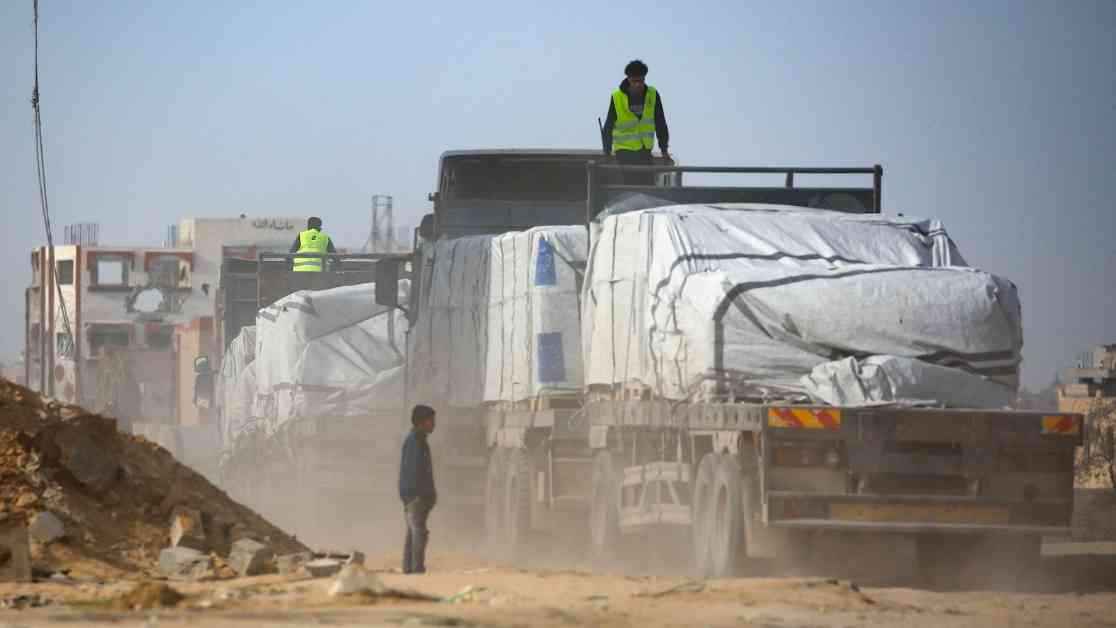Israeli Prime Minister Benjamin Netanyahu’s office recently made a bold move by imposing a blockade on all humanitarian aid entering the Gaza Strip. This decision came after the expiration of phase 1 of Israel’s ceasefire deal with Hamas, with negotiations for phase 2 still in progress. The announcement, which demanded the release of all hostages, stirred up tensions in the region and drew international attention.
Israel’s Blockade on Gaza Aid
Prime Minister Netanyahu’s office declared that all entry of goods and supplies into Gaza would cease immediately. The statement accused Hamas of rejecting the terms laid out for continued discussions by President Donald Trump’s Middle East envoy, Steve Witkoff. The Israeli source revealed that this decision was made in coordination with the Trump administration, signaling a united front in the face of ongoing negotiations.
Witkoff’s proposal involved extending the ceasefire through the Ramadan and Passover holidays, with a deadline set for April 20. The terms stipulated that Hamas would release half of the remaining hostages on the first day, with the rest to be freed upon reaching a permanent ceasefire agreement. However, Hamas denounced Netanyahu’s block on humanitarian aid as “cheap blackmail” and a violation of the agreement, calling for international intervention to uphold their end of the bargain.
Hamas Responds to Israeli Actions
In response to the Israeli blockade, Hamas condemned the move as a war crime and a betrayal of the ceasefire agreement. The group reiterated its commitment to the signed deal and expressed readiness to move forward with negotiations for the next phase. Hamas called on the U.S. to intervene and ensure that Israel fulfills its obligations under the agreement, emphasizing the importance of humanitarian aid for the people of Gaza.
Meanwhile, the Israel Defense Forces carried out an airstrike in Beit Hanoun, targeting individuals suspected of planting an explosive device near IDF troops. This escalation of military action further heightened tensions in the region, adding to the complexities of the ceasefire negotiations and raising concerns about the potential for further conflict.
As the situation unfolds, both sides remain entrenched in their positions, with the fate of the hostages hanging in the balance. The international community watches closely, hoping for a peaceful resolution to the conflict and a return to stability in the region.
The decision to halt aid to Gaza has far-reaching implications, impacting the lives of innocent civilians caught in the crossfire of political tensions and power struggles. As the blockade takes effect, the humanitarian crisis in Gaza deepens, underscoring the urgent need for a diplomatic solution to end the cycle of violence and suffering.
Amidst the geopolitical maneuvers and military posturing, the human cost of the conflict is often overlooked. Families in Gaza struggle to survive amid the rubble of war, relying on aid to meet their basic needs and provide for their loved ones. The blockade threatens to exacerbate their already dire circumstances, highlighting the urgency of finding a lasting peace that addresses the root causes of the conflict.
In the midst of uncertainty and unrest, the voices of ordinary people are often drowned out by the rhetoric of politicians and the clamor of conflict. Yet, it is their resilience and determination that offer a glimmer of hope in the darkness of war. As the world watches and waits for a resolution to the crisis, their plight serves as a poignant reminder of the human toll of political strife and the urgent need for compassion and understanding in the pursuit of peace.


